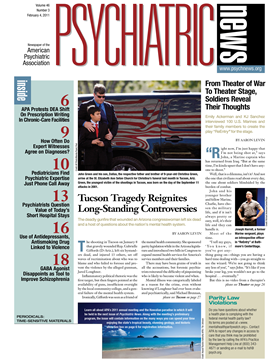Right now, I'm just happy that I'm not being shot at,” says John, a Marine captain who has returned from Iraq. “But at the same time, I'm kinda upset that I don't have anyone to shoot.”
Well, that is a dilemma, isn't it? And not the one that civilians read about every day, the one about soldiers blindsided by the burden of combat.
John and his younger brother and fellow Marine, Charlie, have chosen the military life, and if it isn't always pretty or easy, well, it's their life and they can handle it.
Most of the time.
“I tell my guys, ‘You know, if you've got anything going on—things you are having a hard time dealing with—you go straight to see the wizard. We're not going to think any less of you’,” says John. “It's like if you broke your leg, you wouldn't not go to the hospital . . . eventually.”
But this is no video from a therapist's office or the inner reaches of a VA hospital. Beyond the harsh lights illuminating three men and two women sits an attentive first-night audience at Baltimore's CenterStage.
John, Charlie, their mom, and their sister Liz are played by four of the five actors in “ReEntry,” a play written by Emily Ackerman and KJ Sanchez of the American Records Theater Company and directed by Sanchez.
The fifth person on stage is not only an actor but also a former U.S. Marine staff sergeant. In “ReEntry,” Joseph Harrell plays an older, wiser senior officer who constructs the play's framing device, a talk to the families of Marines who are about to return home from deployment.
Don't pathologize the military experience, cautioned Harrell in an interview with Psychiatric News. “Some guys love it.”
The play's blunt, profane, jittery, explosive language reflects its origins in the words of actual combat veterans.
Ackerman and Sanchez recorded interviews with more than 100 U.S. Marines, their family members, and friends to develop the background for “ReEntry.” However, most of the play's content derives from extensive conversations with Ackerman's two brothers, who served in Iraq and Afghanistan.
“You have to be a compassionate, nonjudgmental, nonopinionated listener,” Sanchez told Psychiatric News.
The playwrights “did a great job of capturing and dramatizing the voices,” said retired Brig. Gen. Stephen Xenakis, M.D., a former U.S. Army psychiatrist, who attended the opening-night performance. Those voices were consistent with Xenakis' own conversations with veterans and their families.
Ackerman's younger brother (“Charlie”) survived a roadside bomb blast in Iraq while his sister was developing the play, Ackerman said in an interview. That event ultimately became a core element in the play, combining personal trauma, disfiguring injury, and the deaths of comrades in arms.
But one thing is clear: they may have posttraumatic stress disorder symptoms or skate too close to suicide, but these guys aren't asking for or expecting pity. In fact, they can barely control their discomfort when well-meaning civilians offer the now-standard “Thank you for your service” line in airports and bars.
The women in the play are the wife, mother, and sister of the two Marines. (One is clearly a stand-in for Ackerman.) They are not hearthside homebodies waiting patiently for their men to return. The women worry about the men's safety, but they also understand the warriors' need to be part of the Marine Corps.
“I'm not married to a Marine—we're a Marine family,” says one.
When one character is wounded too badly to fight again and is discharged, it's as if he and his wife are being cast out of the Garden of Eden.
“Our home was the base,” he says. “For us it was leaving, having to leave your home—really for the first time.”
In recent years, theatrical works drawing from plays ancient and contemporary have explored the effects of war on the soldier (Psychiatric News, March 5, 2010). Performances at military bases and hospitals open up conversations among warriors on issues that would otherwise go unspoken, according to Xenakis.
“Art and literature stimulate different feelings and turn on different parts of the brain beyond the ones we do as physicians and counselors,” he said. “There are some constraints imposed on us by our role—a certain authority attributed to us by our positions, especially when we are officers talking to enlisted soldiers. We need to be sensitive to that barrier, because it's our responsibility to get around it.”
“ReEntry” may resonate most with those who have lived through war, but it confronts the home-front theatergoer, too.
Ackerman and Sanchez said they tried to keep away from politics in the play and in their interviews with sources. But near the end, John, the professional officer, has some pointed words for civilians who have few personal ties to America's wars or those who fight them.
“Honestly, I could give a shit what this war is about,” he says. “And, you know, our boss changes every four years. I'm gonna keep doing my job. We are the arm of the people. You elect the people who tell us what to do, and we go and do it. You don't like it? Don't elect retards who don't know what the fuck they're doing.”


